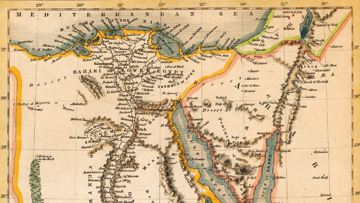You have free articles remaining this month.
Subscribe to the RP Witness for full access to new articles and the complete archives.
The Book of Numbers is broken into five sections that outline three encampments and two travelogues.
- In Numbers 1:1-10:10, Israel prepares for travel.
- Numbers 10:11-12:16 records the travel from Sinai to the area of Kadesh-Barnea. “Now in the second year, in the second month, on the twentieth of the month, the cloud was lifted from over the tabernacle of the testimony; and the sons of Israel set out on their journeys…according to the commandment of the Lord through Moses” (10:11, 13).
- Numbers 13-19 records Israel’s trials as the people are encamped in the area of Kadesh.
- Numbers 20-21 recounts the journey from Kadesh-Barbea to the Plains of Moab.
- Numbers 22-36 tells the story of Israel camped on the Plains of Moab.
Before their journey, the people are numbered, organized for war, and given their order of march. At Kadesh, Moses sends the spies into Canaan. When the spies give their report, the people respond with fear and lamentation.
Then all the congregation lifted up their voices and cried, and the people wept that night. All the sons of Israel grumbled against Moses and Aaron; and the whole congregation said to them, “Would that we had died in the land of Egypt! Or would that we had died in this wilderness! Why is the Lord bringing us into this land, to fall by the sword?” (Num. 13:1-3).
The people languished in the wilderness. What was God’s objective in allowing them to suffer? Once in Moab, God reminds the people, “The Lord your God has led you in the wilderness these forty years, that He might humble you, testing you, to know what was in your heart, whether you would keep His commandments or not” (Deut. 8:2).
The Apostle Paul highlights three incidents that Moses records in Numbers: the rebellion of Korah, the grumbling of the people resulting in the plague of fiery serpents, and the harlotry of the people with Baal of Peor (1 Cor. 8–10; Num. 16:1-40; 21:1-9; and 25:1-9).
Paul also interprets for us God’s testing of the people in the wilderness. “Now these things happened as examples [types] for us” (1 Cor. 10:6). That is, the Old Testament church in the wilderness was a type and shadow of the New Testament church. Paul repeats this assessment, “Now these things happened to them as an example [typologically], and they were written for our instruction, upon whom the ends of the ages have come” (1 Cor. 10:11).
In other words, the Old Testament narratives in the Book of Numbers tell us about the weaknesses and sins of the Old Testament people. We can look back and see how God dealt with them and tested them, and we can learn from their experiences how God will deal with us. Yes, the records of the wilderness experience in the Book of Numbers “were written for our instruction.”
Like ancient Israel, we have been redeemed from bondage and we anticipate entering our own promised land, heaven. In this sense, we are now the church in the wilderness. However, our “wilderness experience” has a promise of better things, God’s promise to strengthen us and carry us through our times of temptation and testing.
No temptation [test] has overtaken you but such as is common to man; and God is faithful, who will not allow you to be tempted [tested] beyond what you are able, but with the temptation [test] will provide the way of escape [the outcome] also, so that you will be able to endure it (1 Cor. 10:13).
So, the Book of Numbers teaches us how to live in this present world as the church in the wilderness.
Dennis J. Prutow | reformedvoice.com/rptsprof
